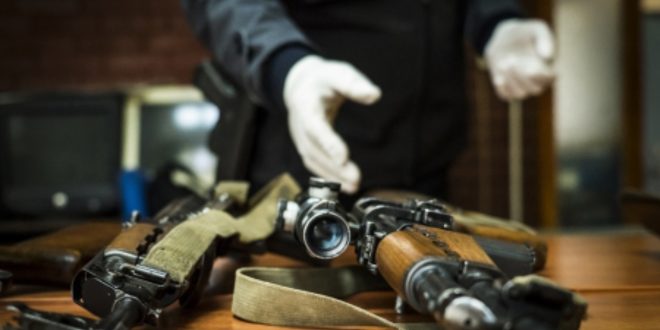mikeyp
NES Member

INTERPOL gives the World Customs Organization (WCO) the global body access to its 1.4M database on illicit firearms. - Soldier of Fortune Magazine
World Customs Organization receives access to INTERPOL’s iARMS database LYON, France – INTERPOL has
LYON, France – INTERPOL has signed an agreement with the World Customs Organization (WCO) granting the global body access to its database on illicit firearms.
The agreement further strengthens the longstanding cooperation between the two organizations in the fight against trafficking, organized crime and terrorism, leveraging the global customs mandate of the WCO to help identify and cut off the flow of illicit weapons.
Under the agreement, the WCO will have real-time access to search the more than 1.4 million records of illicit firearms contained in the INTERPOL Illicit Arms Records and tracing Management System (iARMS) database, as well as access to firearms identification reference material via the INTERPOL Firearms Reference Table (IFRT).
The WCO will also be able to submit international trace requests for suspicious firearms recovered during its customs activities and operations, to help identify when and where a firearm was diverted into illicit use.
If a search made by the WCO triggers a match in the database, a notification will be sent to the INTERPOL General Secretariat, the WCO and the INTERPOL National Central Bureau (NCB) in the country which recorded the weapon in the database.
“The proliferation of illicit firearms presents a threat to global security which police cannot tackle alone. As guns are trafficked across borders, partners like the WCO provide invaluable support on the ground to intercept these weapons and keep them out of the hands of dangerous criminal networks,” said INTERPOL Secretary General Jürgen Stock.
Longstanding collaboration
INTERPOL and the WCO have worked closely to combat all forms of illicit trafficking worldwide for more than 20 years, since first signing a cooperation agreement in 1998.
“Access to INTERPOL’s iARMS will enable the WCO to provide operational support to its members, as the WCO Information and Intelligence Centre (I2C) will now be able to input search queries in the iARMS database on behalf of member customs administrations not yet having been granted access. This collaboration underpins the strong partnership between the WCO and INTERPOL in the global fight against terrorism and other types of organized crime, for which close national, regional and international customs and police cooperation is crucial,” said Kunio Mikuriya, WCO Secretary General.
In recent years the two organizations have collaborated on a number of global and regional operations, including:
- Operation Trigger III (2017) and IV (2018) – firearms trafficking in West Africa, and the Middle East and North Africa, respectively;
- Operation Neptune II (2019) – maritime border security operation in Europe and North Africa;
- Operation Pangea XIII (2020) – global operation against pharmaceutical crime;
- Operation Adwenpa (2016-2019) – border management operation in West Africa.
In addition the two organizations are also partnering in the Programme Global Shield, an international effort to monitor the licit flow and illicit trafficking of precursor chemicals and any other materials which could be used by terrorist and other criminals to manufacture Improvised Explosive Devices (IED).
The iARMS project is funded by the European Union.
Police worldwide can record illicit firearms in the iARMS database and can search seized to check if they have been reported as lost, stolen, trafficked or smuggled.
With over a million records, iARMS can help identify firearms trafficking patterns and smuggling routes.
Firearm tracing can:
- Link a suspect to a firearm in a criminal investigation;
- Identify potential firearm traffickers;
- Detect firearm crime trends;
- Support targeted intelligence-led police operations aimed at curbing the firearms supply to terrorist networks and violent individuals.
Firearm tracing is the systematic tracking of a firearm that has been found or seized, from the point of manufacture or the point of legal importation into a country, through the lines of supply to the last known point of possession. Firearm tracing involves close cooperation among law enforcement, customs and border control agencies internationally.
The iARMS database is crucial to help trace illicit seized firearms. A trace request can be quickly sent to the country of manufacture or last legal import or any other country on the investigative trail.
Firearms of interest
Obviously not all firearms are illicit. IARM’s definition is based on a number of legal considerations:
- compliance with the law of the country in whose territorial jurisdiction it is found,
- violation of a UN Security Council arms embargo;
- non-compliance with the International Tracing Instrument;
- manufacture or transfer without the relevant licence.
iARMS is divided into three components:
- The Firearm Records Module facilitates international communication on lost, stolen, trafficked and smuggled firearms.
- The Trace Requests Module enables users to create, manage and respond to international firearm trace requests on crime-related firearms.
- The Statistics and Reports Module supports INTERPOL member countries to analyse national data information on firearm-related crime and tracing, and to generate tailored reports.
